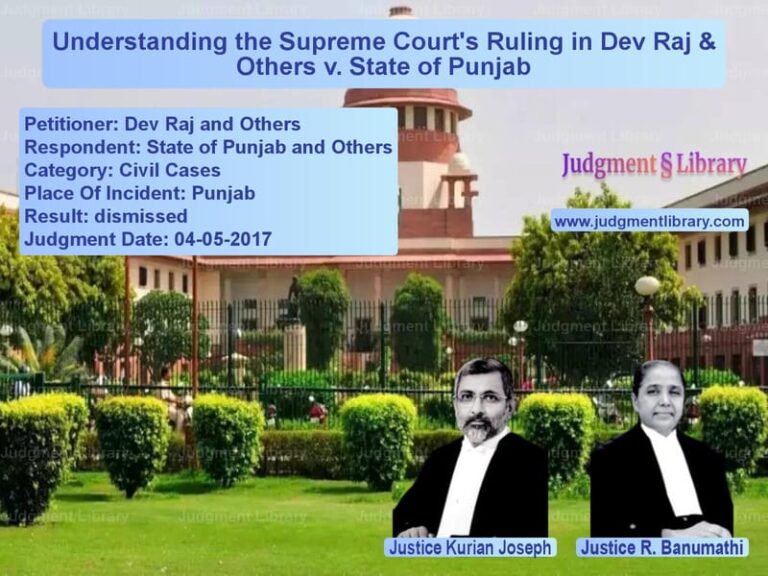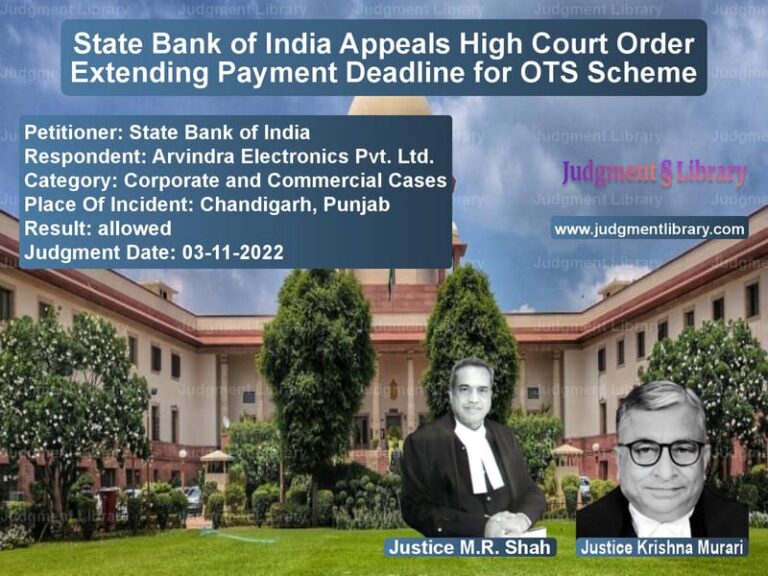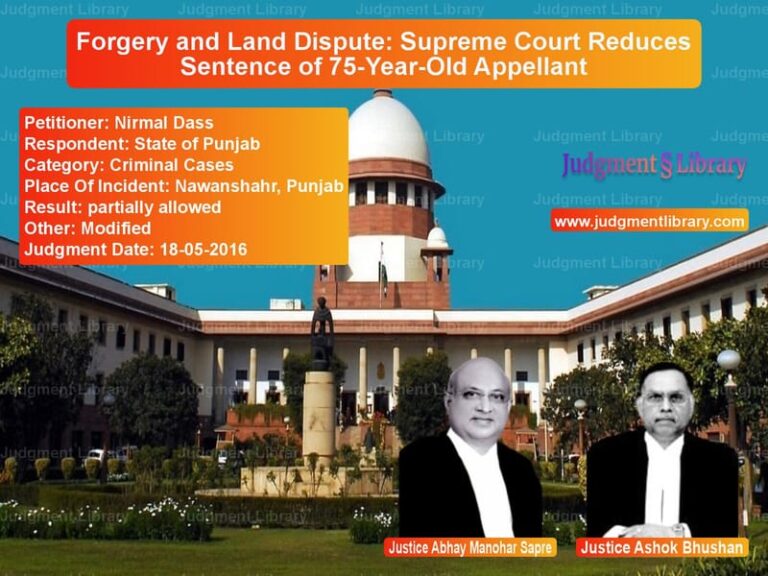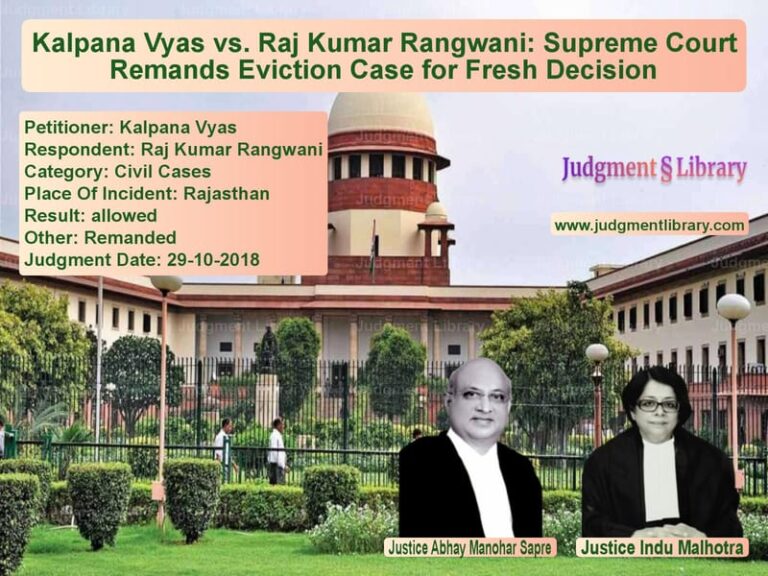Supreme Court Overturns High Court Order for Cost Recovery in Bail Case
The Supreme Court, in the case of Dilipkumar vs. The State of Maharashtra, delivered a crucial ruling regarding anticipatory bail and financial recovery orders imposed by the High Court. The judgment overturned the High Court’s directive to recover Rs. 10,00,000 (Rupees Ten Lacs) from the appellant, stating that such a directive was beyond the scope of the case.
Background of the Case
The appellant, Dilipkumar, had approached the Bombay High Court seeking anticipatory bail under Section 438 of the Criminal Procedure Code (CrPC). While considering the application, the High Court not only deliberated on bail but also ordered that the appellant be made liable for a cost amounting to Rs. 10,00,000, which was awarded by the Supreme Court in a separate civil appeal, Civil Appeal No. 2374/2010.
Aggrieved by this directive, the appellant approached the Supreme Court, contending that the High Court had exceeded its jurisdiction by issuing an unrelated financial recovery order while considering his bail plea.
Key Legal Issues Considered
- Whether the High Court was justified in directing the recovery of Rs. 10,00,000 in a bail proceeding.
- Whether a financial liability from an unrelated civil case could be imposed on an appellant in a criminal proceeding.
- Whether the Supreme Court should intervene and set aside the recovery order.
Petitioner’s (Appellant’s) Arguments
The appellant, through senior counsel Siddharth Luthra, argued:
- He had already been granted regular bail after arrest by the High Court and did not require protection under Section 438 CrPC anymore.
- The High Court, while considering his anticipatory bail plea, went beyond its jurisdiction by including cost recovery as a directive.
- The amount of Rs. 10,00,000 pertained to a separate civil case and was unrelated to the present criminal proceedings.
- It was not within the High Court’s authority to collaterally decide financial liabilities from a different Supreme Court ruling.
Respondent’s (State of Maharashtra) Arguments
The prosecution argued:
- The High Court had the authority to impose conditions while considering a bail plea.
- The directive for cost recovery was a reasonable step in ensuring compliance with a Supreme Court ruling.
- Although the financial liability arose from a separate case, the appellant had an obligation to settle the amount.
Supreme Court’s Analysis and Judgment
The Supreme Court, comprising Justices Kurian Joseph and R. Banumathi, ruled in favor of the appellant, observing that the High Court had erred in passing an unrelated recovery order during a bail hearing.
1. High Court Exceeded Its Jurisdiction
The Supreme Court held that the High Court was wrong in issuing an order for financial recovery in a bail proceeding:
“The High Court has gravely gone wrong in passing an order for recovery of the said amount. It was not an issue arising in the case.”
2. Financial Recovery Should Not Be Decided in a Criminal Bail Proceeding
The Court ruled that the High Court had no authority to decide financial liabilities arising from a separate civil case:
“It was not for the High Court to collaterally consider and decide who should be made liable for the costs awarded by this Court in a different case.”
3. Granting Relief to the Appellant
The Supreme Court, acknowledging the wrongful imposition of financial recovery, vacated the High Court’s order:
“This appeal is allowed and the order regarding recovery of Rs. 10,00,000 from the appellant is vacated.”
Final Orders
- The Supreme Court set aside the High Court’s directive to recover Rs. 10,00,000 from the appellant.
- The ruling reaffirmed that financial liabilities from civil matters cannot be imposed during criminal proceedings.
- The appellant was relieved of any financial recovery obligation arising from Civil Appeal No. 2374/2010.
Legal Implications
1. Separation of Civil and Criminal Proceedings
The judgment reinforces the principle that civil and criminal proceedings must remain distinct, and financial liabilities cannot be imposed in unrelated criminal bail hearings.
2. Judicial Overreach and Bail Conditions
The ruling clarifies that High Courts cannot impose arbitrary financial conditions unrelated to the bail matter under consideration.
3. Protection of Due Process
The Supreme Court’s intervention ensures that financial recoveries must follow due process and cannot be arbitrarily linked to criminal bail matters.
Conclusion
The Supreme Court’s judgment in Dilipkumar vs. The State of Maharashtra sets a precedent in preventing judicial overreach in bail matters. By striking down the High Court’s order for cost recovery, the Court has reinforced procedural fairness and ensured that financial liabilities from civil cases are not improperly enforced in criminal proceedings.
Don’t miss out on the full details! Download the complete judgment in PDF format below and gain valuable insights instantly!
Download Judgment: Dilipkumar vs The State of Maharas Supreme Court of India Judgment Dated 09-08-2017.pdf
Direct Downlaod Judgment: Direct downlaod this Judgment
See all petitions in Bail and Anticipatory Bail
See all petitions in Fraud and Forgery
See all petitions in Legal Malpractice
See all petitions in Judgment by Kurian Joseph
See all petitions in Judgment by R. Banumathi
See all petitions in allowed
See all petitions in Quashed
See all petitions in supreme court of India judgments August 2017
See all petitions in 2017 judgments
See all posts in Criminal Cases Category
See all allowed petitions in Criminal Cases Category
See all Dismissed petitions in Criminal Cases Category
See all partially allowed petitions in Criminal Cases Category







